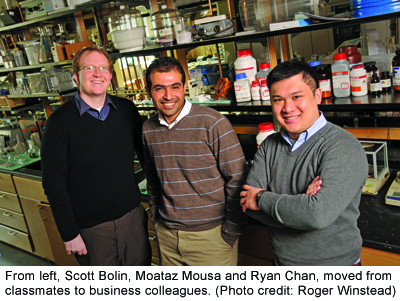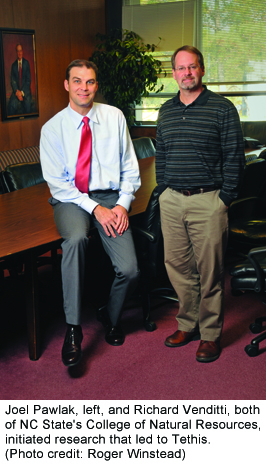From Research, Innovation and Economic Development, NC State University
Release date 2.13.13
Raleigh, NC – An NC State startup company commercializing technology that removes salt and other materials from water created as a by-product of industrial processes – useful in processes like hydraulic fracturing, or “fracking” – has received $800K in private funding.
Tethis, Inc., which is located in Raleigh, recently closed a Series A stock round. The company is commercializing a technology, originated in North Carolina State University’s College of Natural Resources, to remove salt and other hazardous materials from water generated as a by-product of industrial processes, including fracking.
 Blackstone Network Executive Director Bob Creeden says Tethis co-founder and CEO Scott Bolin is exactly the kind of entrepreneur that the Blackstone Network is positioned to help. “Scott brought the right combination of a high-potential technology developed at NC State and the passion to pursue forming a company,” Creeden says.
Blackstone Network Executive Director Bob Creeden says Tethis co-founder and CEO Scott Bolin is exactly the kind of entrepreneur that the Blackstone Network is positioned to help. “Scott brought the right combination of a high-potential technology developed at NC State and the passion to pursue forming a company,” Creeden says.
The funding round was led by seasoned area entrepreneur Chris Evans, who became involved with Tethis in his role as the company’s mentor-lead in the Triangle-based Blackstone Entrepreneurs Network. Evans, co-founder of DaVinci Systems, founder of Hotlinx and Accipiter and an NC State alumnus, invested $100,000 of his own money in the company and will remain involved as executive chairman.
 Bolin, Moataz Mousa and Ryan Chan moved Tethis from a class project in NC State’s HiTEC program to licensing the technology developed by professors Joel Pawlak and Richard Venditti to form Tethis. The new company also is a member of the 2013 NC State Fast 15, receiving launch support from the university’s New Venture Services.
Bolin, Moataz Mousa and Ryan Chan moved Tethis from a class project in NC State’s HiTEC program to licensing the technology developed by professors Joel Pawlak and Richard Venditti to form Tethis. The new company also is a member of the 2013 NC State Fast 15, receiving launch support from the university’s New Venture Services.
“NC State and the Blackstone Entrepreneurs Network have built a strong relationship focused on driving new venture success. Their mentor network combines with our innovation ecosystem to help new companies grow,” says Vice Chancellor Terri Lomax of NC State’s Office of Research, Innovation and Economic Development.
The group of investors meets key strategic interests for the company and brings experience. “We wanted to raise the capital necessary to sustain our commercialization efforts, but we also wanted to have investors who know the markets we’ll play in and can help the company as it evolves,” Evans adds.
Through the Blackstone Network, Bolin also was invited to pitch the technology at Blackstone’s corporate headquarters to industry experts and investment managers, resulting in key connections and an opportunity for site-testing the technology.
The treatment and disposal of saltwater and brine is a global challenge costing industry and governments billions annually. The markets for saltwater treatment include the desalination and recycling of frack flowback water – salt-laden water that is a byproduct of hydraulically fractured gas wells. To do this, the company uses Tethex, a biodegradable foam licensed from NC State, that binds with dissolved salts, minerals and other materials, allowing them to be removed from wastewater.
About NC State’s Entrepreneurship Ecosystem: NC State’s Office of Technology Transfer evaluates university-developed technology, with an eye for commercial potential within existing companies or as the basis of startups. New Venture Services, within OTT, provides company launch support through the annual Fast 15, a grouping of the most compelling business opportunities from faculty research and student creativity across the university. The Poole College of Management’s Graduate Technology Entrepreneurship and Commercialization Program, known as HiTEC, develop venture-grade commercialization plans through student courses. Learn more at research.ncsu.edu/ott.
About the Blackstone Entrepreneurs Network: Blackstone Entrepreneurs Network was launched with a gift from The Blackstone Charitable Foundation in 2011. The Network draws from a regional pool of veteran entrepreneurs (EIRs) who help identify marketable innovations out of area universities and regional startups with the greatest potential to become high-growth companies. EIRs work as a team to mentor these local entrepreneurs in company building, make connections to their network of experts and funders, and provide access to the broader Blackstone Entrepreneurs Network. This greater network includes sector experts, venture coaches, angel investors and administrative and marketing support. Learn more at blackstoneentrepreneursnetwork.org.
For more information:
Gene Pinder | Research, Innovation and Economic Development, NC State University | 919-515-7036
Michelle Bolas | Blackstone Entrepreneurs Network | 919-225-2607





